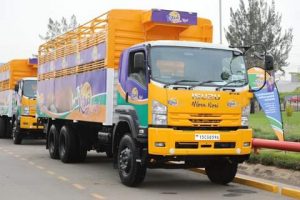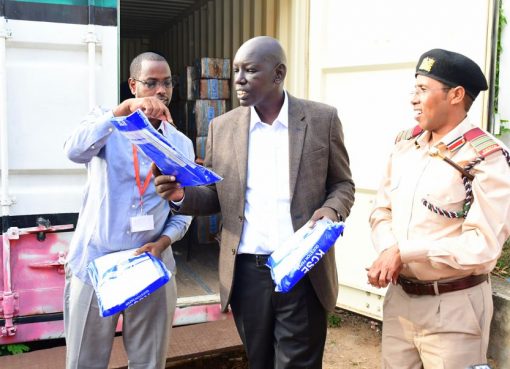Kitui County Governor, Charity Ngilu, yesterday, launched the Kitui Livestock Carrier vehicles worth Sh.60 Million at a function held at General Motors (GM), Nairobi.
She observed that the five carrier lorries will see livestock farmers and meat traders, smoothen operations in the facilitation of transport between markets and delivery of the livestock to abattoirs, including the Kenya Meat Commission (KMC) depots.
The Governor expressed her pleasure on the project, in a post on her official Facebook account dated September 20, 2021, citing better market opportunities to the farmer.
“I am pleased to launch the Kitui Livestock carriers. The carriers will be available to livestock farmers and traders, to facilitate livestock transportation between markets and delivery of livestock to abattoirs like the Kenya Meat Commission (KMC) depots,” the post read.
She also noted that, among the 17 livestock markets, some are too far from each other hence the carriers will ease movement and maintain quality.
“Kitui has 17 main livestock markets. Some are too far from each other, with Tseikuru market in Mwingi North located 300km From Mutha in Kitui South,” she said.
Ngilu underscored the fate of livestock farmers in Kitui, who have been suffering in the hands of brokers and middlemen, due to lack of a proper market platform, citing the project as big step, in empowering the small livestock farmer.
She revealed that, with the escalating drought in the county which has led to drying up of pastures and lack of water for the animals, the project will help the farmer to destock, to a manageable stock, during this dry season.
While addressing the residents at Kabati market, Kitui West, she noted that significant weight loss by livestock as they move amounts to losses.
“Owing to the long distances our livestock trek across markets, they lose a lot of weight amounting to Sh60billion, every week and Sh3.5billion, every year in estimate. The project will, therefore, minimize these movements and retain the money we lose, through the reduced value and poor quality beef,” she observed.
She also clarified that the returns from the carriers, will be re-invested back into the livestock industry to ensure farmers realize full returns.

She lamented that dependency on other counties for basic products as setback in the development of the County.
“It’s by these empowerment developments that we are going to rely on ourselves, by utilizing our local resources and become self-dependent. Nearly everything we consume in our County, is from other counties, including food and vegetables, things we can do on our own. It’s, therefore by these projects, that we’ll have enough capital to utilize the local resources for our sustainability,” she lamented.
By Denson Mututo and Francis Mwendwa





